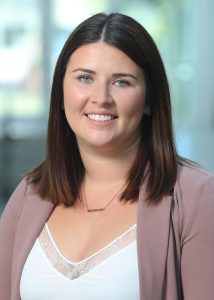By: Christina Torrealba (she/her), Graduate Student in Community Health and Epidemiology
Featuring: Hannah Asprey, Mercedes Stemm and RJ Roggeveen
The Indigenous Health in Medicine (IHIM) program at Dalhousie supports Indigenous students across Wabanaki and beyond, who are interested in pursuing a career in medicine, through recruitment, community collaboration and partnerships. With programs and supports for youth in elementary, junior high and high school, mentorships for undergraduate students, sharing circles for medical students, and resource sharing for residents, IHIM strives to support Indigenous students every step of the way. For my first blogpost with the Global Health Office, I checked in with Hannah Asprey (she/her), Mercedes Stemm (she/her), and RJ Roggeveen (he/they) to learn about their roles and what’s happening at IHIM.
Hannah Asprey began her role as Program Manager of the IHIM program in August 2021. Upon graduating from Saint Mary’s University in 2017 with a Bachelor in Commerce, she worked in various leadership roles at CIBC, and then as the Director of Education for Millbrook First Nation. Now, as the Program Manager for IHIM, Hannah is continuing to work with and advocate for Indigenous students as they further their education, while fostering relationships with Indigenous communities across the Maritimes. Of course, starting a new job in an online format during a global pandemic comes with a unique set of challenges, but Hannah says that the virtual connections she has been able to make with people across the country have added to the strength of this program.
Hannah says that her biggest success in this role so far has been in reaching out to students across Nova Scotia, New Brunswick and Prince Edward Island. With the input and perspectives of students and external stakeholders, she has been able to shape the program to better support and meet the needs of Indigenous students.
“The best is yet to come”
The biggest challenge that the IHIM program is facing right now is the small number of Indigenous physicians who can take on mentorship roles in the program. “The best is yet to come”, says Hannah, as the group of Indigenous residents and medical students involved with IHIM grows, with over 20 Indigenous students who self-identify as Mi’kmaq, Métis, Inuit and other First Nation students involved across all four years of undergraduate medical education. One thing that Hannah wants readers to know is that this program supports everyone! “From the time you may be interested in medicine, to when you are a practicing physician, we want to ensure we can support our Indigenous communities all along the way”, she says.
Working closely with Hannah is Mercedes Stemm, the Program Coordinator at IHIM. Mercedes started working with IHIM as a student assistant in October 2019, while she was working on her Bachelor of Science degree at Dalhousie. She graduated this year with a major in neuroscience and a minor in Indigenous studies, and then began her new role as the Program Coordinator.
Mercedes says that one of her biggest successes while working with IHIM has been creating a Johnson Scholarship Foundation (JSF) Pre-Medicine Mentorship Program for Indigenous students. Working in collaboration with PLANS, this program provides supports and mentor/mentee opportunities for Indigenous and African Nova Scotian students interested in medicine. “The main purpose of this program is to reduce and eliminate barriers to underrepresented students exploring their full potential as learners”, says Mercedes.
Community outreach during COVID has been challenging of course, but the team has been doing their best to promote the program virtually to support Indigenous students. Mercedes says that despite the challenges, remote work has given her the opportunity to make connections with people across Canada and internationally whom she otherwise would not have been able to work with.
The new Program Assistant at IHIM is RJ Roggeveen, a Therapeutic Recreation student at Dalhousie in their final year of undergraduate studies. RJ says that they wish they had found this program sooner: “as an Indigenous student I have been looking for ways to incorporate my culture into my future professions and current studies.” RJ is thrilled to be working with the IHIM team. He is excited to be able to promote the program to fellow students who also need the support but may not know that IHIM exists.
Since taking on this role, RJ says that their biggest success has been meeting and developing relationships with the team at the Global Health Office and members of the community. “I did not know many Indigenous community members at Dal and since being in my role, I have met many amazing students who I can relate to,” they say. Having joined the team with many COVID restrictions still in place and during Dalhousie’s reopening, RJ has found working both online and in-person to be challenging but they are adjusting to working in a hybrid setting.
RJ is currently working to organize an MCAT study group for Indigenous students who are interested in medicine. He wants to make sure that all Indigenous students applying to medicine know that this group exists and that “they are welcome to join at any point”.
“We’re here to help you throughout your journey into medicine”
Hannah, Mercedes and RJ encourage Indigenous students interested in medicine to reach out to them at IHIM@dal.ca. As Mercedes says, “we’re here to help you throughout your journey into medicine. We help students from elementary school all the way to medical school and beyond.” Be sure to follow IHIM on Twitter, Facebook and Instagram, and keep an eye on the IHIM webpage to stay up to date with this program!





